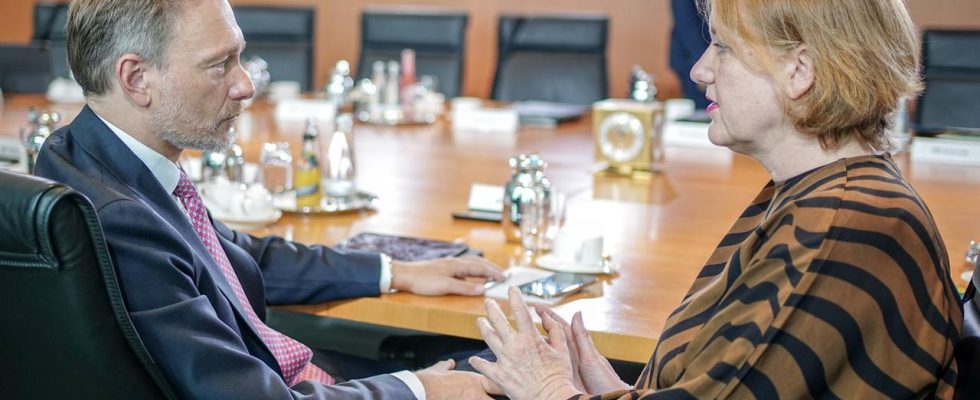The budget for 2024 should be ready at the beginning of February. The waiting period brings risks for sponsoring associations. They worry about employees and rental contracts. Democracy projects are affected, but also the THW.
Checking emergency vehicles, preparing large-scale exercises or learning how to use the breaker – that’s what Bufdis do at the Technical Relief Agency (THW). But it could be that fewer of them will be available for operational exercises in the next few weeks.
Because the budget crisis is slowing down the providers: a “double-digit number” of applicants for the federal voluntary service cannot start in January, says Janis Becker, head of department at the THW. If the applicants are flexible in terms of time, try to arrange a later start.
Since it is unclear when that will be, that is not enough for everyone: “There are cases in which people generally refrain from completing a federal voluntary service,” says Becker. Not a good start to the year for an organization that relies so much on voluntary work and youth work.
The responsible Federal Office for Family and Civil Society Tasks only says that there are “currently no budget funds available for further agreements” for 2024. It is known that “the current budget situation (…) is associated with considerable uncertainty” – and is “being clarified”. In addition to the THW, this also applies to Diakonie and other providers, for example.
layoffs Exit aids from the Right-wing extremism
Waiting for a budget – especially for social projects and services – can be a threat to the existence of a person. In some places it has already led to layoffs: ten employees were “terminated literally overnight,” says Christian Pfeil, board member of the umbrella organization “Exit to Get Started,” which offers help getting out of right-wing extremism.
Model projects will expire at the end of the year, such as the further training of educators who learn how to continue talking to right-wing extremist young people and help them leave.
There were also layoffs at the local advisory centers. “It is not yet foreseeable whether and when these terminations can be withdrawn,” says Pfeil.
Even if the sponsoring associations get their money soon, there may still be damage: Highly qualified employees could “look for new opportunities on the job market” and “consultation processes that sometimes last several years” with those who have left the right-wing extremist scene would be canceled.
Risk for carriers remains
Projects from the “Living Democracy” program, which is funded by the Federal Ministry for Family Affairs, are severely affected. These include 358 Partnerships for Democracy across the country, which, for example, help organize schoolyard tours and inform young people how they can help shape their village.
Almost two thirds of these partnerships receive their commitments for one year each. “A notice has now been sent for the affected projects with approval for the early start of measures from January 1st, 2024,” writes the Ministry of Family Affairs at the request of the ARD capital studios. This means that the projects can continue and there will probably still be funding available – but it still represents a risk for the sponsors.
Clubs have to pay in advance
Mike Stampehl from the Partnership for Democracy in Westhavelland speaks of a “very depressing situation for many colleagues”. There are a number of projects in which rental or internet contracts were terminated because of the unclear prospects.
After all, many municipalities have shown that the work is important to them: “Some of them stepped in and decided to pre-finance for up to three months,” says Stampehl.
For exit counseling, which is also funded by the Ministry of Family Affairs, the promise of an “early start to measures” is not yet a solution. As long as several providers do not have funding notices, the following applies: “The work can continue, but money for wages, rent and operating costs will only flow later,” is how Christian Pfeil from the “Exit to Entry” association summarizes it.
Sponsoring associations would have to make advance payments: “For larger structures, this may still be possible,” says Pfeil. However, smaller consultations would have their “backs to the wall” because they had hardly any financial reserves.
Cuts expected
Diakonie, as a major sponsor, sees its democracy projects as secured for the time being. However, the migration advice that is offered through small providers and state diakonias is at acute risk: “It is still unclear how much money we will get from 2024,” says Hanna Steide-Glaßer from the diakonia.
Massive cuts are threatened – a third less funding: “If that happens, locations will close. Our offer can then no longer be maintained across the board.”
Demand is increasing enormously due to the increased number of migrants: “We help with the search for daycare places, apartments, language courses – all of that has become more difficult,” says Steide-Glaßner.
Every week counts
Social workers and psychologists are increasingly concerned with “social peace” in a community. They would be met with hostility locally and would now receive few positive signals from budget policy: “These are skilled workers who can easily find something elsewhere. They are still with us because they think idealistically,” says Steide-Glaßner. “But that doesn’t work in the long term.”
They all have one thing in common: it’s about every week now. The longer the budget consultations last, the more difficult it becomes – for example because interim financing expires or skilled workers get permanent contracts elsewhere.
Some exit helpers are trying to bridge their work against right-wing extremism for a few weeks “with an emergency staff,” says board member Christian Pfeil. Politicians are planning to have the new budget ready at the beginning of February. “A longer break until March would result in the end of the projects,” warns Pfeil.

